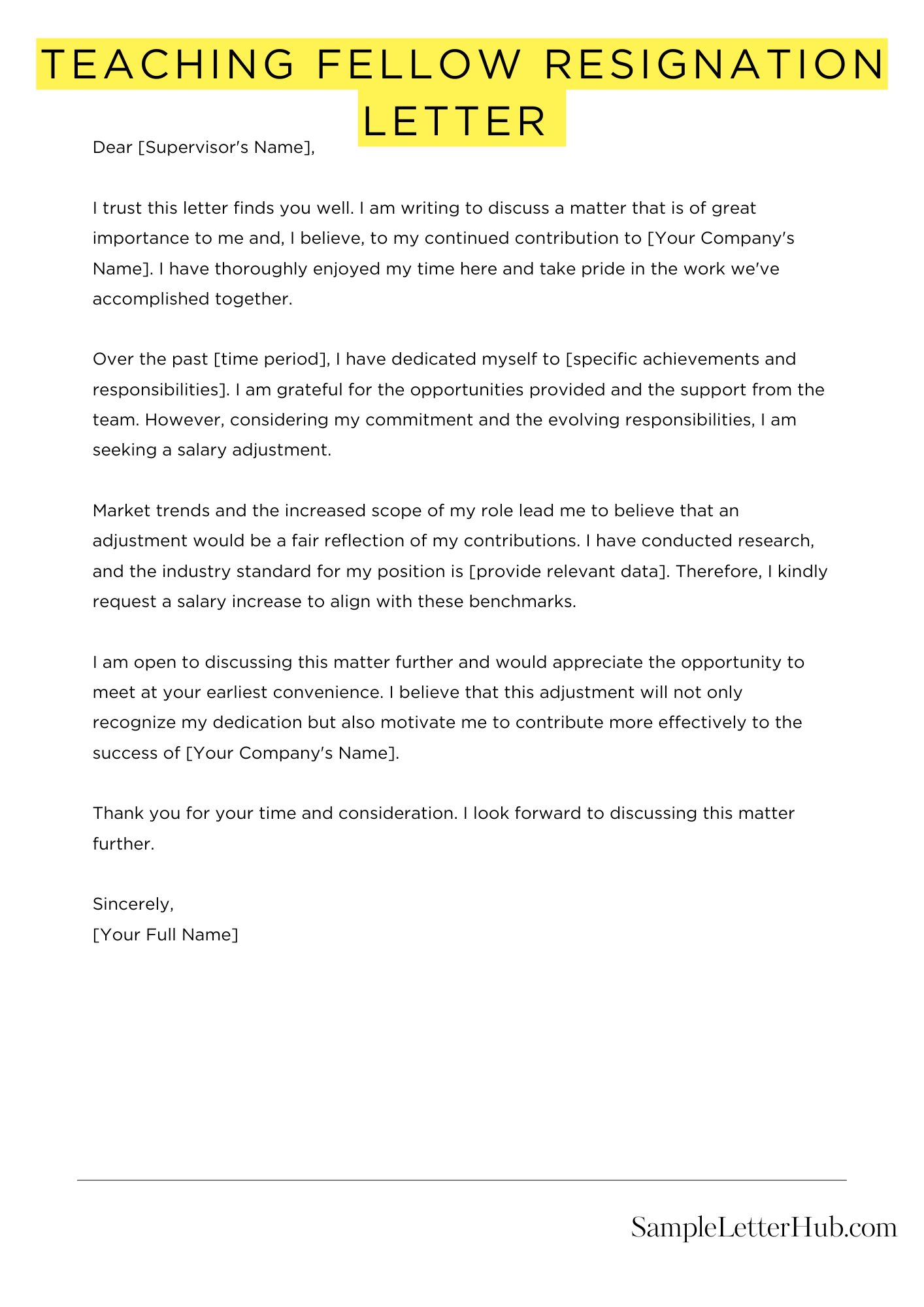When it comes to resigning from your teaching fellow position, a well-crafted resignation letter is essential. In this article, we’ll share an example teaching fellow resignation letter to help you navigate the complexities of leaving your role.
Remember, a resignation letter is not just a formality; it’s an opportunity to express your gratitude and leave a positive impression. Be polite, humble, and professional in your tone. Clearly state your decision to resign and your last date of employment.
Below, you’ll find a template teaching fellow resignation letter that you can tailor to your specific situation. Use it as a starting point to create a letter that reflects your experience and intentions. Remember, leaving a job is a significant step, but with a clear and well-written resignation letter, you can transition smoothly to your next chapter.
Teaching Fellow Resignation Letter
Dear [Recipient Name],
Please accept this letter as formal notification that I will be resigning from my position as Teaching Fellow at [Organization Name], effective [Last Date of Employment].
I have thoroughly enjoyed my time at [Organization Name] and am grateful for the opportunities and experiences I have gained during my tenure. I have learned a great deal and have had the pleasure of working with a dedicated and inspiring team.
I wish you and [Organization Name] all the best in the future.
Sincerely,
[Your Name]
Short Teaching Fellow Resignation Letter Sample
Please accept this letter as formal notification that I am resigning from my position as Teaching Fellow at [Company Name]. My last day of employment will be [Your Last Day]. Thank you for the opportunity to grow and learn during my time here. I wish you and the company continued success. I am happy to assist in the transition process to ensure a smooth handover of my responsibilities.
I wish you all the best with your teaching fellow resignation letter.
When it’s time to say farewell, expressing your gratitude and best wishes can make the transition smoother:

How to Write a Teaching Fellow Resignation Letter
1. Start with a Formal Salutation
Begin your letter with a formal salutation, such as “Dear [Dean’s Name]”. This shows respect for your supervisor and sets a professional tone for your letter.
2. State Your Intention to Resign
Clearly state your intention to resign from your position as a Teaching Fellow. Include the date of your last day of employment.
3. Express Gratitude
Take this opportunity to express your gratitude for the opportunity to work as a Teaching Fellow. Mention specific experiences or individuals that have made your time valuable.
4. Offer Assistance
If possible, offer to assist in the transition process. This could include helping to train your replacement or providing guidance on ongoing projects.
5. Close with a Professional Farewell
End your letter with a professional farewell, such as “Sincerely” or “Best regards”. Include your signature and typed name below.
Teaching Fellow Resignation Letter: 6 Frequently Asked Questions
1. What are the key elements of a teaching fellow resignation letter?
A teaching fellow resignation letter should include your name, position, the date you’re resigning, and the date your resignation will take effect. It should also express your gratitude for the opportunity to work as a teaching fellow and state your reasons for leaving.
2. How should I format my resignation letter?
Your resignation letter should be formal and concise. It should be single-spaced and use a standard font. You should also proofread your letter carefully before submitting it.
3. What are some common reasons for resigning as a teaching fellow?
Some common reasons for resigning as a teaching fellow include pursuing further education, taking on a new job, or moving to a new location.
4. How much notice should I give?
It’s generally considered good practice to give at least two weeks’ notice when resigning from a teaching fellow position. However, you may need to give more notice if you have a long-term contract.
5. What should I do if I’m not sure whether I want to resign?
If you’re not sure whether you want to resign, it’s a good idea to talk to your supervisor or a trusted colleague. They can help you weigh the pros and cons of resigning and make a decision that’s right for you.
6. What are some tips for writing a strong resignation letter?
Here are a few tips for writing a strong resignation letter:
- Be clear and concise.
- Be professional and respectful.
- Express your gratitude for the opportunity to work as a teaching fellow.
- State your reasons for leaving.
- Offer to help with the transition.
Before making the decision to resign from your job, it’s essential to consider the legal aspects:
Understanding your emotions after quitting your job is important. Explore why you might be feeling sad:
Related
- Resignation letter sample
- Forced resignation letter
- Resignation letter due to going abroad
- Resignation letter due to marriage
- Resignation letter due to other opportunity
- Resignation letter due to mistake

